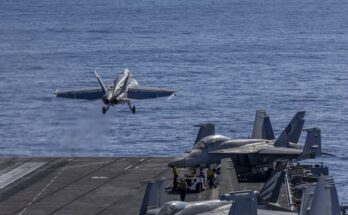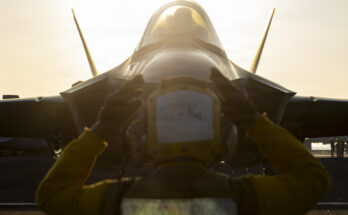Reports in South Korean media indicate that Indonesia is looking to renegotiate its involvement in joint development of the KF-21 Boramae combat aircraft. Concerned over costs incurred in joint development projects, incoming president-elect and current defense minister Prabowo Subianto is looking to trim Indonesia’s financial share in the KF-21 program.
The move comes as Indonesia looks to balance its long-term efforts to upgrade the Indonesian National Defense-Air Force (TNI-AU) fighter component – referred to as the Minimum Essential Force (MEF) program – with a degree of fiscal restraint.
Indonesia has in place firm orders for 42 Dassault Rafale combat aircraft, coupled with a commitment towards a future buy of 24 Boeing F-15EXs. These purchases – along with plans to acquire 48 KF-21s once the aircraft moves into serial production – are to form the backbone of the future combat fleet.
Meanwhile, a prior commitment to a 12-unit purchase of second-hand Dassault Mirage 2000-5s from Qatari Emiri Air Force stocks announced on June 15, 2023, was subsequently canceled in February with budgetary restraints cited as the reason.
The Mirage cancellation renders Indonesia’s short-term commitment towards the KF-21 project unclear, particularly as the Indonesian government seeks to shrink its funding portion in the developmental program from KRW1.7 trillion ($1.25 billion) to KRW600 billion ($440 million), a roughly 65 percent cut.
Indonesia’s involvement in South Korea’s KF-X (Korean Fighter Xperiment) program – aimed at developing a twin-engine, 4.5-generation combat aircraft with high-end avionics systems – dates to 2010, when a cooperative agreement was reached with South Korea (and later signed in August 2012). A final joint development contract was then signed by the two partners on January 7, 2016.
Under the deal, the Indonesian side would invest 20 percent of the KRW8.8 trillion ($6.2 billion in 2016 dollars) in developmental costs. In return it was to receive one fighter prototype as well as access to technical data and information involved in the aircraft program.
Payments on the 20 percent contribution would run through 2028.
But Indonesia backslid on its payments and ultimately renegotiated its investment to KRW1.6 trillion ($1.18 billion), while seeking a carveout that 30 percent of this total could be provided through “in kind” payments of palm oil.
Yet to date Indonesia has provided just KRW300-380 billion ($221-280 million) of its agreed-upon total investment share.
Making matters between the two partners worse, South Korean authorities arrested two Indonesian engineers working at Korea Aerospace Industries (KAI) for allegedly attempting to steal confidential technical data on the program back in March. The matter is now subject to a major police investigation in South Korea.
Reports also indicate that the Indonesian side has so far been unhappy with the level of technology transfer offered up by South Korea.
Nonetheless, Indonesia appears to remain interested in purchasing the full lot of 48 KF-21s, which would be built locally at a state-owned PT Dirgantara Indonesia (PTDI) facility.
South Korea’s Defense Acquisition Program Administration (DAPA) is believed to be ready to accept Indonesia’s reduced cost share, but with the caveat that in return Jakarta will be provided with fewer technology transfers.
A final decision from the South Korean side is expected to be announced at the end of the month. Indonesia will then need to figure out its timeline for purchasing the KF-21, and more importantly whether a full purchase of 48 units makes fiscal sense in the medium-term.
Dan Darling is Forecast International’s director of military and defense markets. In this role, Dan oversees a team of analysts tasked with covering everything from budgeting to weapons systems to defense electronics and military aerospace. Additionally, for over 17 years Dan has, at various times, authored the International Military Markets reports for Europe, Eurasia, the Middle East and the Asia-Pacific region.
Dan's work has been cited in Defense News, Real Clear Defense, Asian Military Review, Al Jazeera, and Financial Express, among others, and he has also contributed commentary to The Diplomat, The National Interest and World Politics Review. He has been quoted in Arabian Business, the Financial Times, Flight International, The New York Times, Bloomberg and National Defense Magazine.
In addition, Dan has made guest appearances on the online radio show Midrats and on The Media Line, as well as The Red Line Podcast, plus media appearances on France 24 and World Is One News (WION).




